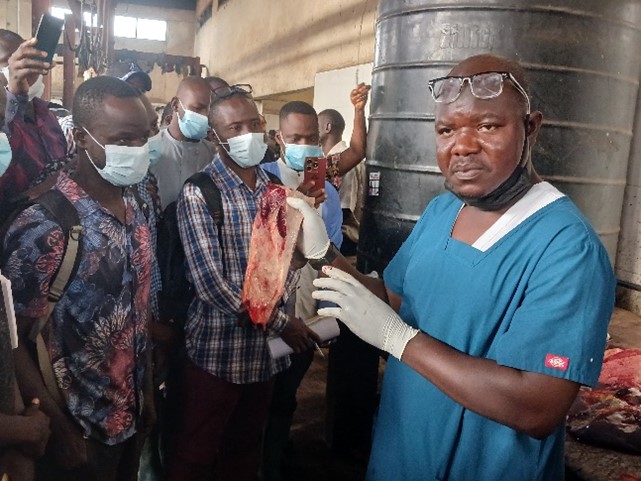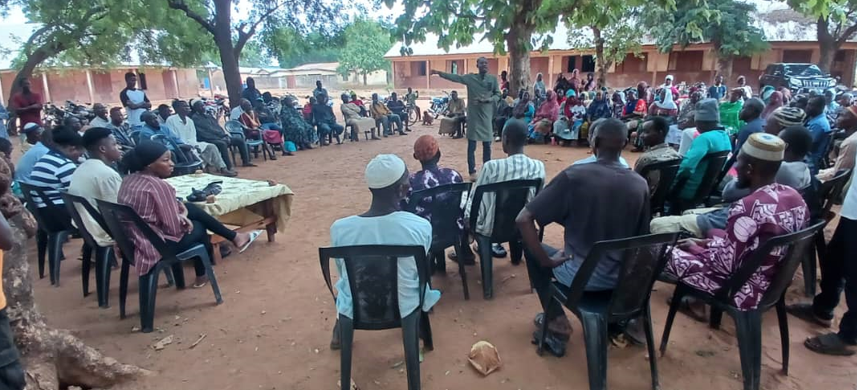Augustine Amedzi, Surveillance Specialist, FHI 360
Evans Nosh, Animal Health Specialist, FHI 360
Kafui Dzasi, Regional Laboratory & Antimicrobial Resistance/Antimicrobial Use Advisor, FHI 360
In collaboration with key stakeholders, the Meeting Targets and Maintaining Epidemic Control (EpiC) project in Ghana has implemented a global health security (GHS) strategies to enhance capacity to prevent, assess, report, and respond to public health threats in targeted regions and districts of Ghana.
EpiC partnered with the Veterinary Services Directorate (VSD), Ghana Health Service (GHS) Public Health Division (PHD), Environmental Protection Agency (EPA), Environmental Health Unit of the Ministry of Sanitation and Water Resources, Food and Agriculture Organization/Emergency Center for Transboundary Animal Diseases (FAO/ECTAD), One Health Coordinating Secretariat, World Health Organization (WHO), Ghana Antimicrobial Resistance (AMR) Secretariat, and The Foreign, Commonwealth and Development Office/Department for Environment, Food and Rural Affairs (FCDO/DEFRA)
One Health (OH) is a collaborative, multisectoral, and multi-disciplinary approach—working at the local, regional, national, and global levels—that recognizes the interconnection between people, animals, plants, and their shared environment. This requires coordination and alignment of efforts and resources across a wide range of stakeholders as well as environmental agencies and other relevant sectors. The complexity of this endeavour stems from the need to coordinate actions, share information, and integrate strategies to address emerging infectious diseases and other health risks that occur at the intersection of humans, animals, and the environment.
EpiC has enhanced collaboration to improve surveillance systems across human, animal, and environmental sectors. By collaborating closely with the Veterinary Services Directorate, Ghana Health Service, and Public Health Division, surveillance mechanisms have been significantly expanded. In collaboration with VSD, EpiC has reviewed and updated guidelines, standard operating procedures (SOPs), and data collection tools for Ghana’s six priority zoonotic diseases and trained OH stakeholders from human, animal, and environmental health sectors on the updated guidelines. EpiC also helped the trained OH stakeholders conduct community advocacy sessions on the prevention of zoonotic disease spillover to humans. As a result, community volunteers have improved their understanding of case definitions of Ghana’s six priority zoonotic diseases. Veterinarians and community volunteers have expanded their scope of data collection and improved on reporting timelines and quality of data reported. Community volunteers have improved their capacity on signals identification and reporting on the priority zoonotic diseases. Together, these efforts have improved monitoring of infectious diseases at the interface between humans, animals, and the environment. Capacity for early detection of potential outbreaks and the implementation of timely response measures has improved and are helping control the spread of diseases and minimizing their impact on public health.
Through EpiC’s interventions, OH partners are now coordinating and working together. For example, veterinarians are now conducting meat inspection in collaboration with environmental health officers. OH stakeholders have come together to form platforms at regional and district levels to work toward achieving a common OH goal. Improved coordination, data collection, analysis and use has led to improved evidence-based decision making.
EpiC Ghana has also led capacity-building initiatives with key stakeholders. By partnering with the Veterinary Services Directorate, Environmental Protection Agency, Ghana Health Service, Wildlife Directorate, FAO/ECTAD, and WHO, EpiC has organized training programs to enhance the skills of veterinarians and environmental health officers in disease surveillance and laboratory diagnostics. For example, the project organized a quality management system (QMS) training for veterinary laboratories in collaboration with the FAO and C19 VETLAB Project. These efforts have equipped frontline workers with the tools and knowledge to effectively manage emerging health threats, thereby bolstering overall health security.

To enhance Ghana’s health surveillance capabilities, EpiC Ghana is focusing on antimicrobial resistance (AMR) surveillance and laboratory capacity building. Recognizing the importance of AMR in global health security, the project collaborates with the Ghana AMR Secretariat, FAO/ECTAD, WHO, and other key stakeholders to implement a comprehensive integrated strategic plan for AMR monitoring.
EpiC has worked directly with the AMR Secretariat and OH stakeholders to gather and review existing documents and develop a draft integrated antimicrobial resistance (AMR), antimicrobial use (AMU), and antimicrobial consumption (AMC) surveillance strategy. EpiC conducted a workshop and reviewed the draft AMR/AMU/AMC integrated strategy with 50 OH stakeholders and is currently working to review, validate, and finalize the strategy. As a first step in building laboratory capacity, the project conducted needs assessments in nine out of ten animal health laboratories. EpiC is procuring needed equipment and reagents identified in the assessment.
Additionally, the project has promoted intersectoral coordination and communication through the One Health Coordinating Secretariat. This platform enables regular meetings and information sharing among stakeholders from various sectors, fostering a holistic approach to disease prevention and control. Consequently, collaborative strategies have been developed and implemented, addressing complex health challenges that necessitate interdisciplinary solutions.
EpiC Ghana’s commitment to enhancing collaboration to strengthen global health security highlights the critical role of partnership and coordination among stakeholders. By harnessing the expertise and resources of key partners, notable progress has been achieved in improving the ability to respond to infectious disease threats, thereby protecting the health and well-being of the population.
Featured photo: Community advocacy for hunters, wildlife traders, meat vendors, and community leaders on safe handling of meat to prevent zoonotic disease spillover by syndromic surveillance. Photo By Augustine Amedzi, FHI 360.

